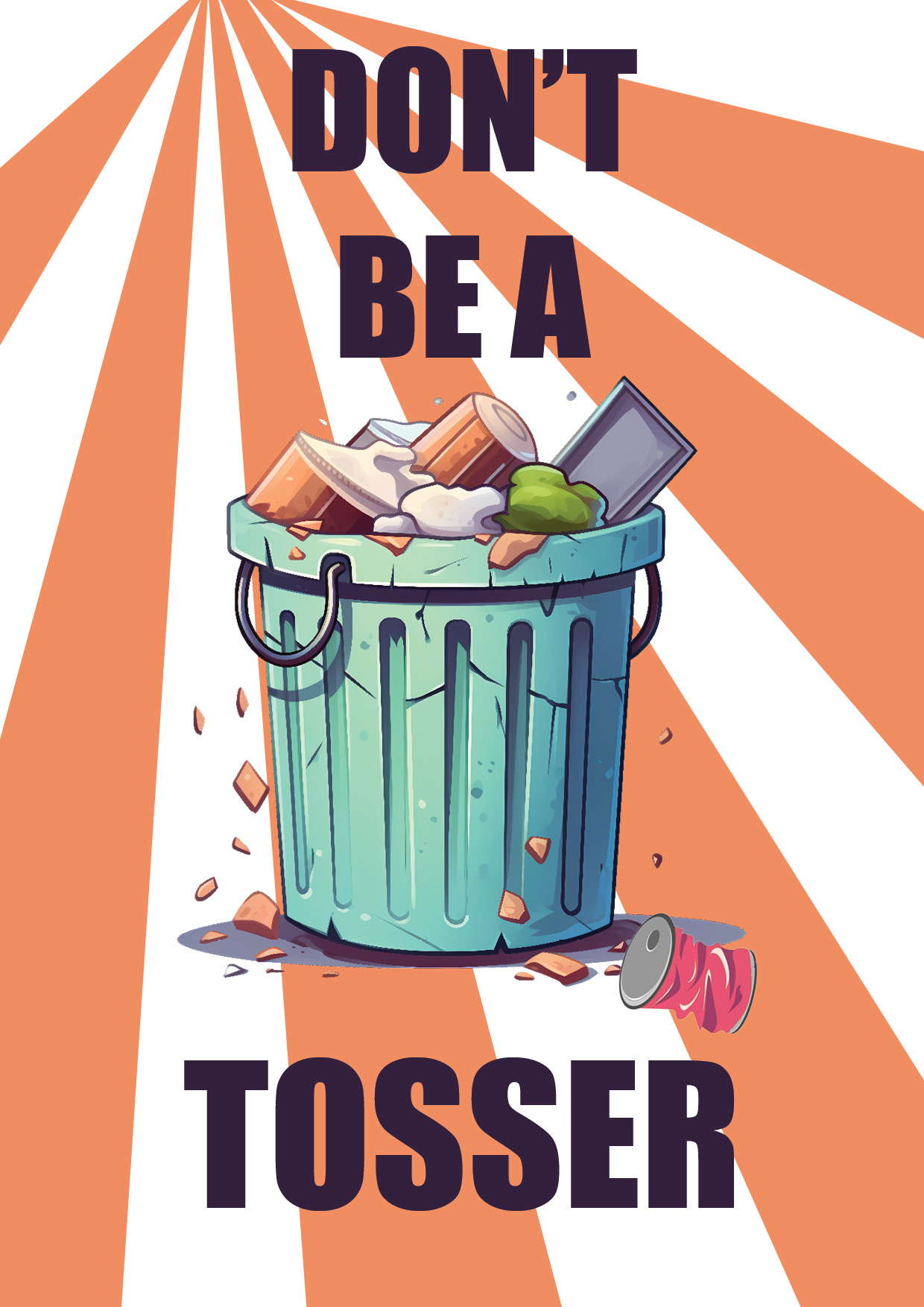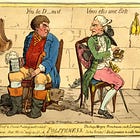This post was inspired by correspondence with the cultural anthropologist Marcelo Pisarro about insults and was informed by a conversation with the evolutionary anthropologist Lia Betti about swearing in Italian. I was planning to make it a more general piece, but had so much to say about ‘asshole’ and ‘wanker’ that I never really got past those two words!
Having thought long and hard about the matter, I have recently come to the conclusion that there is no direct British or Australian equivalent to the American term ‘asshole’. Of course, I’m speaking of assholes in their metaphoric sense—obviously, literal assholes are like opinions insofar as everybody has one. But as the linguists Keith Allan and Kate Burridge have illustrated at length in their book Forbidden Words, an ‘asshole’ is not the same thing as an ‘anus’. Instead, it’s part of a class of words called dysphemisms: derogatory terms that form the basis of insults.
‘Anus’ and ‘faeces’ carry little power as insults because they are orthophemisms: direct, neutral expressions. Nor do their euphemistic forms (e.g., ‘poo chute’ and ‘poo’) carry much sting—at least, for those beyond the age of five. But terms like ‘asshole’ and ‘shithead’ send an entirely different message, which is why we choose them over ‘anus’ and ‘faeces-head’ when we want to express our displeasure at the person who has just cut us off in traffic.
Still, ‘asshole’ (or, rather, ‘arsehole’) is not a term one hears much in the UK in anything except its most literal sense. Instead, other insults are generally favoured: probably ‘wanker’ most commonly—a term that Americans are relatively unfamiliar with, as the TV series Ted Lasso demonstrates. The orthophemistic form of wanker is ‘masturbator’, but it has come to refer to a lazy, incompetent or unpleasant person, much like its sibling ‘tosser’, which is basically a lesser form of the same insult.
Still, although wankers and assholes are both, broadly speaking, unpleasant and annoying, the terms are not synonyms. The character of Ted Lasso himself is a perfect illustration of the difference. Although frequently called a wanker at the outset of the series, due largely to the fact that he is an American football coach utterly clueless about soccer, in no way is his character an asshole—quite the opposite.
Perhaps the core difference between a wanker and an asshole is that the former, while annoying, doesn’t know they’re annoying. But as Denis Leary’s classic song ‘Asshole’ makes clear, part of what makes an asshole an asshole is that they know full well that they are behaving badly; they just don’t care.
In his book Assholes: A Theory, the philosopher Aaron James defines an asshole as someone who ‘systematically allows himself to enjoy special advantages in interpersonal relations out of an entrenched sense of entitlement that immunizes him against the complaints of other people’. Interestingly, this makes the anus a particularly appropriate orifice to symbolise an asshole, who is, after all, someone who metaphorically shits on others.1
In different ways, both James and Denis Leary suggest that the US provides fertile cultural breeding ground for assholes. Indeed, James speculates that the US produces more assholes than Canada, Japan and Norway, albeit about the same volume as Brazil, Italy and Israel. However, he acknowledges that ‘one might be skeptical about whether there is any statistically significant cross-cultural or cross-temporal variation in how many assholes are getting produced. The issue is finally one for anthropologists and sociologists to settle’.
Although James is careful to acknowledge the significance of cultural variation in what counts as rude behaviour, and he recognises that some traits we associate with assholes (like queue jumping) have culturally specific meanings, his core assumption is that assholery is universal, but flourishes under some social and cultural conditions. However, anthropologically speaking, I’m not convinced we can speak of assholery in any universal sense.
Take Italy, which James insists produces a disproportionate number of assholes, although he provides no support for the claim beyond exhibits like the former prime ministers Benito Mussolini, Giulio Andreotti and Silvio Berlusconi, who James labels the ‘paradigmatic asshole of public life’. Certainly, Berlusconi was a polarising figure in Italy (and internationally), and attracted a wide array of insults during his numerous terms in office—in fact, so many that in a typically flamboyant move, he published a book in 2005 titled Berlusconi Ti Odio (I Hate You, Berlusconi) compiling the 500-odd insults he had received.2
Beyond terms like mafioso, Primo Pinocchio (due to his penchant for lying) and megalomane (‘megalomaniac’), Berlusconi was frequently labeled a coglione—an insult that is often translated into English as ‘asshole’, although its literal meaning is ‘testicle’. For instance, crowds were wont to chant it during his public appearances, and on one occasion a reporter asked Berlusconi: Sei un coglione o una persona intelligente? (‘Are you a testicle or a person of intelligence?’).
But while a coglione is a stupid, annoying and unpleasant person, and is just as common an insult in Italy as ‘asshole’ is in the USA, it arguably doesn’t contain the sense of arrogance and entitlement that Leary and James suggest is intrinsic to assholery as Americans define it. This is why it’s frequently also translated as ‘dickhead’ and ‘dumbass’. To quote a Redditor on a thread about swearing in Italian, ‘“Coglione” is the way of the describing a person “as stupid as testicles”’.3
My point is that assholery seems to be a peculiarly American preoccupation. On one level, this is self-evident, given that Americans pioneered its use as an insult.4 But this, in turn, suggests that the anatomy of the asshole (metaphorically speaking, at least) is a constellation of culturally significant qualities. In other words, insults like ‘asshole’ are what the anthropological linguist Anna Wierzbicka calls ‘cultural keywords’: words that provides insights into cultural values.
Notably, the critique of arrogance and entitlement embedded in the word ‘asshole’ is evident in many American insults—as ‘jerk’, ‘dick’ and ‘douchebag’5 illustrate. Again, none of these insults have direct British equivalents. ‘Wanker’, ‘twat’ and ‘knob’6 might seem like synonyms, but a ‘knob’ is not quite the same thing as a ‘dick’, although both are dysphemisms for ‘penis’. Arguably, there’s a sense of intentional meanness when someone is being a ‘dick’ that’s missing when they are being a ‘knob’.
Likewise, although ‘wanker’ can carry connotations of entitlement, self-absorption and pretentiousness in the UK, it’s more generic in meaning. As Green’s Dictionary of Slang makes clear, anyone stupid and unpleasant can be called a wanker—a point that holds equally true for terms like ‘tosser’, ‘twat’ and ‘knob’.
Notably, this is less true in Australia—at least, when it comes to wanker.7 According to Green’s Dictionary of Slang, in its Australian form, ‘wanker’ and its adjectival and verb forms (‘wanky’ and ‘wank’, respectively), by definition, implicitly connote pretentiousness. Thus, from an Australian perspective, the expression ‘pretentious wanker’ (which is widely used in the UK) is a redundancy. This is why the scene in the British film Sliding Doors where Gwyneth Paltrow calls her cheating former partner a ‘sad, sad wanker’ is somewhat jarring to Australian ears. While an insult is clearly called for, ‘wanker’ isn’t quite right (I personally would have gone for one that rhymes with ‘cathetic punt’).
It doesn’t take a genius to see that Americans’ comparatively greater concern with entitlement than Brits’ is connected with their different cultural orientations to class—along with an underlying recognition of the limits of the individualism that is enshrined as a core value in American culture. And that Australians are especially preoccupied with pretentiousness also makes sense, given the cultural value placed on a form of egalitarian individualism in which social differences between people are downplayed.
In sum, although stupid, obnoxious and unpleasant people exist the world over, assholes, wankers and coglione aren’t the same thing—nor, for that matter, are dicks, knobs and jerk-offs. Instead, they speak to fine-grained typologies of knobbish human behaviour that are inflected with cultural views on the cause of this knobbishness. So to misquote Shakespeare, an asshole by any other name might smell, but rampant idiocy with high notes of foolishness has a slightly different fragrance.
Related posts
As illustrated by the ‘dicks, pussies and assholes’ speech in Team America. Unquestionably obscene, the speech makes a surprising amount of cultural sense in terms of the meanings of these insults.
My personal favourite comes from the trade unionist and politician Giuseppe Giulietti, who said of Berlusconi, ‘The Prime Minister is crazy and anthropologically different from the rest of the human race’ (Il premier è matto e antropologicamente diverso dal resto della razza umana).
Frankly, the idea of testicles as stupid makes far more physiological sense than equating balls with strength and courage. As a wise woman* once observed, ‘Why do people say, “Grow some balls”? Balls are weak and sensitive. If you really wanna get tough, grow a vagina. Those things really take a pounding!’ Fun fact: figa—an Italian dysphemism for vagina that is frequently translated as ‘pussy’ or ‘cunt’—is considered vulgar, but is a compliment rather than an insult.
*Not Betty White, for the record, although the quote is often attributed to her.
Not only did they coin it, they appear to be obsessed with mapping its aetiology (see the ‘asshole effect’) and variants (see the ‘asshole circumplex’). At this point, assholery has more variants than Covid. James alone identifies dozens of subcategories, including boorish assholes, smug assholes, corporate assholes, reckless assholes and self-aggrandising assholes.
Douchebag is a good example of an insult that is culturally specific in both form and content, given that vaginal douching is not a common practice in other Anglophone countries. In fact, I never really understood the term until I saw this Summer’s Eve commercial on telly when I was living in the US.
Not to be confused with ‘nob’, although frequently misspelt. A nob, of course, is a largely archaic term for a rich person. British in origin, its influence is evident in San Francisco’s ‘Nob Hill’—a happy coincidence for those subscribing to the asshole effect theory, which suggests that wealth turns nobs into knobs (or, rather, assholes).
Tosser is not common outside of ‘Don’t be a tosser!’ campaigns aiming to get people to stop thoughtlessly tossing rubbish. Everyone knows what a tosser is, and the campaigns rely on this meaning, but it’s not widely employed as an insult. Likewise, ‘twat’ (generally pronounced ‘twot’) is not particularly common either, although everyone recognises it—‘cunt’ is far more frequently used. (I discuss this topic at length in the chapter of my book Silent But Deadly titled ‘You Can’t Say C*nt in Canada’.) ‘Knob’ was fairly common in Australia when I was growing up, but I think ‘dick’ has outcompeted it. (For the record, in Australia, ‘dick’ and ‘knob’ are used as synonyms—the American connotations of meanness are largely absent.)








Wow. So many subtleties and nuances! Who knew? Speaking as a kiwi, now Australian, who was very dissatisfied not to learn many Chinese swear words while living in China for a couple of years. Closest I got was ‘piss breath’ but I was never a confident user. There’s lots of cussing variation’s ‘across the ditch’ between Oz and NZ, but probably fairly subtle to non Australians/kiwis
Yes, I suppose one might, in Canada, use ostensibly gender-specific slurs across gender lines, but in my “mind’s ear” I hear them with a sardonic emphasis, as a criticism of a behaviour, as you say, so, for example, He’s such a slut, or he’s so bitchy, etc., or she’s such an a- hole.